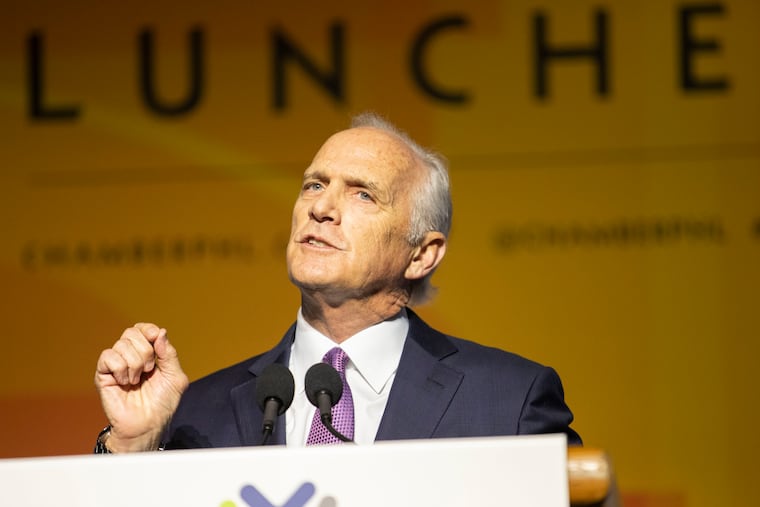A former Philly insurance executive is eyeing a run for Pennsylvania governor
Daniel J. Hilferty, the former CEO of Independence Health Group, has been calling potential donors and gauging interest among supporters for a prospective Republican candidacy.

A former Philadelphia insurance executive is taking steps toward a potential Republican campaign for Pennsylvania governor next year, according to two people familiar with his plans.
Daniel J. Hilferty, the former CEO of Independence Health Group, has been calling potential donors and gauging interest among supporters for a prospective candidacy, according to one person with direct knowledge of the matter. Both people spoke on condition of anonymity because they weren’t authorized to discuss it publicly.
Hilferty, 64, announced in September that he would retire as president and CEO of Independence at the end of 2020, after 10 years leading the region’s largest health insurer. The company said he would remain as an adviser through 2022. During the coronavirus pandemic, he has appeared in Independence television commercials urging people to follow public health guidelines.
Hilferty, who lives in Ardmore, has built a reputation as a major civic leader in Philadelphia. He raised money for big events like Pope Francis’ visit to the city in 2015 and for the Democratic National Convention at the Wells Fargo Center the following year. He’s a former chairman of the Chamber of Commerce for Greater Philadelphia and now serves on the group’s board.
“A lot of people have spoken to me about a variety of opportunities for the next chapter of my life,” Hilferty said in a statement to The Inquirer Thursday evening. “Right now my focus is on my family.”
Pennsylvania has two competitive statewide races next year, with open seats for governor and U.S. Senate. Democratic Gov. Tom Wolf’s second term expires at the end of 2022, and Republican Sen. Pat Toomey isn’t seeking reelection. A plethora of candidates in both parties are expected to run in each race.
» READ MORE: Pat Toomey's retirement makes the 2022 elections in Pennsylvania a total free-for-all
A Hilferty campaign in a statewide GOP primary would test whether a moderate Republican with decades of experience in corporate America could win support within a party that has embraced President Donald Trump’s populist rhetoric and appeal to cultural grievance.
Hilferty, who ran unsuccessfully for lieutenant governor in 1994 as a Democrat, may also face questions about his support for Democrats over the years. He was on the host committee for Joe Biden’s first fund-raiser as a presidential candidate in 2019 at the Philadelphia home of Comcast Corp. executive David L. Cohen.
And Hilferty contributed $5,600 — the maximum amount permitted under federal law — to Biden’s campaign, according to Federal Election Commission records. He gave $80,000 to the Biden Victory Fund, a joint fund-raising committee formed by the Biden campaign and Democratic Party committees. He also gave tens of thousands of dollars to Republican candidates and groups this past election.
Trump’s standing among Republican leaders in Washington has diminished since the election, with many faulting him for the party’s losses in two U.S. Senate runoff elections in Georgia and then for inciting supporters who stormed the Capitol in an attack on American democracy that left five people dead.
The assault on the Capitol led to Trump’s impeachment in the House on Wednesday, making him the first president ever impeached twice.
But there is little evidence that Trump’s strong bond with Republican voters has taken any similar hit. The vast majority of House Republicans, including all nine from Pennsylvania, voted against impeaching him.
Gubernatorial candidates will likely need to raise tens of millions of dollars to be competitive. Wolf’s campaign spent about $30 million on his successful 2018 reelection bid. GOP nominee Scott Wagner’s campaign spent about $20 million.